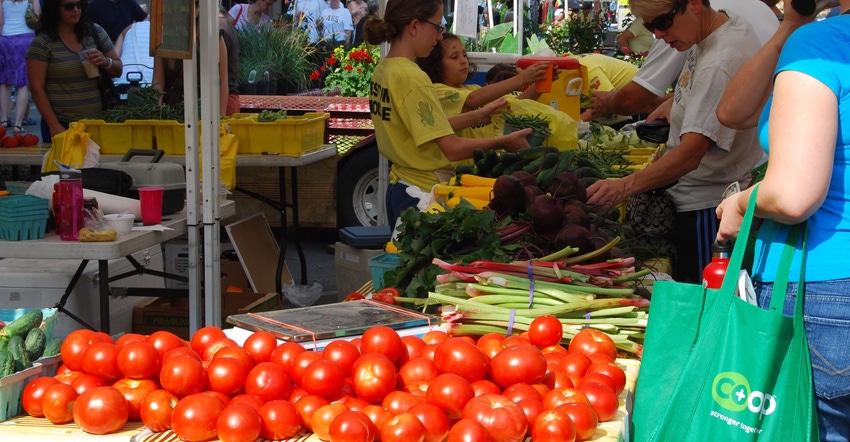April 3, 2018

By Tracy Behnken
In the last few years we've seen more emphasis on the term ag literacy. What is the importance of addressing ag literacy, even in a state like Nebraska with strong agricultural roots? And what measures are being taken to meet this demand?
For most Nebraskans who are devoted to agriculture, there is no doubt that our state has strong agricultural roots. With cash receipts from farm marketings contributing over $21.5 billion to Nebraska's economy in 2016 and with 1 in 4 jobs in the state focusing on agriculture, it is hard to argue against it.
However, today's U.S. population includes less than 2% and close to 5% in Nebraska who live on farms. With 98% of U.S. consumers two or more generations removed from direct farming, it's concerning that most, including Nebraskans, might not understand the importance agriculture has over their daily lives and over our state's economy. Therefore, they are not confident in their food selections from food production through processing and preparation.
In response to these current challenges, Nebraska Extension has formed an interdisciplinary team of agriculturists, family and consumer scientists, food scientists, and 4-H youth development professionals to develop and facilitate ag (food) literacy programs to increase consumer confidence from farm gate to consumer plate.
During 2016, the Extension team worked with the UNL Bureau of Sociological Research Annual Social Indicators Survey to collect statewide data about how Nebraskans think and feel about factors affecting food from production to processing to preparation.
In the 2016 NASIS Food Report, most found every factor to be at least somewhat concerning. Foodborne illness stood out as a concern with over half (53%) very concerned. Nebraska Extension used the survey findings throughout 2017 to guide program planning and activities.
To increase understanding and confidence in our food supply, the Extension team focuses on an array of learners from consumers to agriculture producers and from food service to youth using methods from onsite programs to social media and from on-operation assessments to 4-H school enrichment programming. Extension also reaches out and partners with many commodity groups, the ag business community, health departments, ag advocate groups, youth organizations, media, professional and association groups, and schools to help create an even greater impact across our state.
2017 Nebraska Extension Educational Programing included the following:
Youth. Over 26,000 youth learned about agriculture through various ag literacy programs. Raising Nebraska connected over 356,000 youth and adult consumers to the state’s agriculture. Also, more than 3,600 in the state were certified in Livestock Quality Assurance.
Production ag. Annually, over 2,850 livestock producers increase their knowledge of animal care and stewardship through Beef and Pork Quality Assurance training. About 160 Nebraska dairies increased their knowledge of animal care and practices to ensure food safety, quality and value of milk produced in the state. And over 1,000 farmers attended Crop Field Days, 200 sheep and goat producers were certified in proper healthcare techniques, and 60 fruit and vegetable growers were trained on the latest Food Safety Modernization Act guidelines.
Consumers and food service. Over 42,000 Nebraska youth and adults made changes or reinforced knowledge of food safety practices. Also, 1,806 food service staff participated in food safety training to become a ServSafe manager or ServSafe food handler.
"Barf Bucket" training, a nationally recognized program, trained 434 childcare centers and home providers to prevent spread of norovirus infection.
Furthermore, more than 216,000 accessed web materials to learn about food labeling and reducing food waste, and 200 consumers attended home canning classes.
Food processing. Training and certifications were provided to the food processing industry to support them in meeting regulatory standards, improving food quality and ensuring food safety.
This included 126 professionals in all food sectors qualifying for certification in five programs:
• Better Process School and Acidified Better Process School
• Food Safety Preventive Controls Alliance
• Food Microbiology Workshop
• Food Processing Management Certificate
Because of Nebraska Extension's ag (food) literacy efforts, Nebraskans have increased consumer confidence and make informed, science-based decisions about their practices and choices toward food that benefits their health, and the economic vitality of the state and future generations.
Content for this article was provided by Nebraska Extension 2017 Impact Report on "Increasing Consumer Confidence in Food."
Each year, Nebraska Extension produces impact reports that showcase the work we are doing on behalf of Nebraskans throughout the state. To check out each of our programs to see how we are impacting areas where you have concerns, go to extension.unl.edu/impact.
Behnken, LEAD 15, lives near Bennington with husband Craig (LEAD 21) and their two sons, Walker and Carter. Tracy's brother and mother continue to own and operate the family's registered Holstein dairy farm where she grew up. Behnken serves as a Nebraska Extension 4-H Youth Development educator and unit leader in Washington County. Working in Extension over the past 30 years, she continues to focus on her passion of ag literacy. As part of her focus, Behnken is a member of the Nebraska Extension Consumer Confidence in Food Issue Team, where she provides leadership with ag literacy festivals across the state.
You May Also Like




